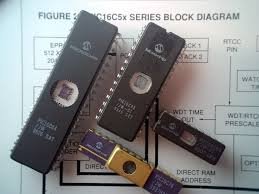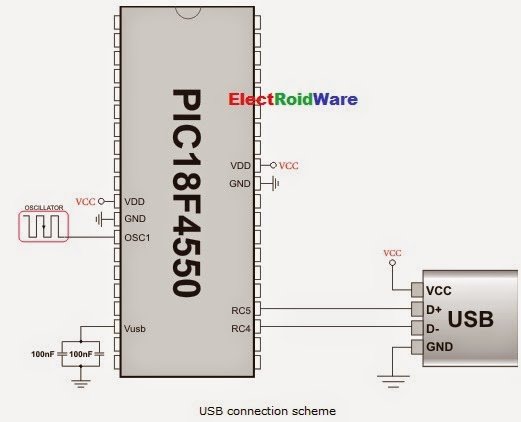Universal Serial Bus (USB) provides a serial bus standard for connecting a wide variety of devices, including computers, cell phones, game consoles, PDA’s, etc.
USB Library contains HID routines that support HID class devices, and also the generic routines that can be used with vendor specified drivers.
USB HID Class
The HID class consists primarily of devices that are used by humans to control the operation of computer systems. Typical examples of HID class devices include :
- Keyboards and pointing devices, for example: standard mouse devices, trackballs, and joysticks.
- Front-panel controls, for example: knobs, switches, buttons, and sliders.
- Controls that might be found on devices such as telephones, VCR remote controls, games or simulation devices, for example: data gloves, throttles, steering wheels, and rudder pedals.
- Devices that may not require human interaction but provide data in a similar format to HID class devices, for example, bar-code readers, thermometers, or voltmeters.
Many typical HID class devices include indicators, specialized displays, audio feedback, and force or tactile feedback. Therefore, the HID class definition includes support for various types of output directed to the end user.
Descriptor File
Each project based on the USB library should include a descriptor source file which contains vendor id and name, product id and name, report length, and other relevant information. To create a descriptor file, use the integrated USB HID terminal of mikroC PRO for PIC (Tools › USB HID Terminal). The default name for descriptor file is USBdsc.c, but you may rename it.

- The USB library routines have been changed. Please, have this in mind when migrating projects from previous versions of the compiler.
- Also, this relates to the descriptor source file, so it is necessary to create a new descriptor file in order to make your project work.
Library Routines
- HID_Enable
- HID_Read
- HID_Write
- HID_Disable
- USB_Interrupt_Proc
- USB_Polling_Proc
- Gen_Enable
- Gen_Read
- Gen_Write
HID_Enable
| Prototype | void HID_Enable(char *readbuff, char *writebuff); |
|---|---|
| Description | Enables USB HID communication. |
| Parameters |
These parameters are used for HID communication. |
| Returns | Nothing. |
| Requires | Nothing. |
| Example |
HID_Enable(&readbuff,&writebuff); |
| Notes | This function needs to be called before using other routines of USB HID Library. |
HID_Read
| Prototype | char HID_Read(void); |
|---|---|
| Description | Receives message from host and stores it in the Read Buffer. |
| Parameters | None. |
| Returns | If the data reading has failed, the function returns 0. Otherwise, it returns number of characters received from the host. |
| Requires | USB HID needs to be enabled before using this function. |
| Example |
// retry until success while(!HID_Read()) ; |
| Notes | None. |
HID_Write
| Prototype | char HID_Write(char *writebuff, char len); |
|---|---|
| Description | Function sends data from Write Buffer writebuff to host. |
| Parameters |
|
| Returns | If the data transmitting has failed, the function returns 0. Otherwise, it returns number of transmitted bytes. |
| Requires | USB HID needs to be enabled before using this function. |
| Example |
// retry until success while(!HID_Write(&writebuff,64)) ; |
| Notes | Function call needs to be repeated as long as data is not successfuly sent. |
HID_Disable
| Prototype | void HID_Disable(void); |
|---|---|
| Description | Disables USB HID communication. |
| Parameters | None. |
| Returns | Nothing. |
| Requires | USB HID needs to be enabled before using this function. |
| Example |
HID_Disable(); |
| Notes | None. |
USB_Interrupt_Proc
| Prototype | void USB_Interrupt_Proc(void); |
|---|---|
| Description | This routine is used for servicing various USB bus events. Should be called inside USB interrupt routine. |
| Parameters | None. |
| Returns | Nothing. |
| Requires | Nothing. |
| Example |
void interrupt() {
USB_Interrupt_Proc();
}
|
| Notes | Do not use this function with USB_Polling_Proc, only one should be used. To enable servicing through interrupt, USB_INTERRUPT constant should be set (it is set by default in descriptor file). |
 USB_Polling_Proc
USB_Polling_Proc
| Prototype | void USB_Polling_Proc(void); |
|---|---|
| Description | This routine is used for servicing various USB bus events. It should be periodically, preferably every 100 microseconds. |
| Parameters | None. |
| Returns | Nothing. |
| Requires | Nothing. |
| Example |
while(1) {
USB_Polling_Proc();
kk = HID_Read();
if (kk != 0) {
for(cnt=0; cnt < 64; cnt++)
writebuff[cnt]=readbuff[cnt];
HID_Write(&writebuff,64);
}
}
|
For more detail: Connect USB HID with PIC18F4450 Code


